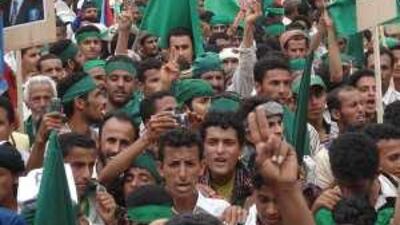RIYADH // Amid deepening concerns that Yemen's atrophying economy is leading to internal collapse, an array of international donors gathered in the Saudi capital yesterday to discuss speeding up millions of dollars in development aid to the Gulf region's poorest state. Underscoring the precarious situation inside Yemen, the two-day conference, held under the auspices of the Gulf Co-operation Council, opened against a backdrop of street protests in the southern part of the country.
Much of the discussion will focus on how to create the technical expertise and management that Yemen needs to efficiently absorb millions of dollars in aid pledged for its development years ago. Donor nations also want to discuss ways to avoid aid dollars being lost to corruption. In 2006, the international community promised US$5.5 billion (Dh20.2bn) in aid to Yemen for the years 2007-2010, with $3.7bn of that coming from wealthy Gulf states.
To date, however, less than 20 per cent of that development aid has been put to work on specific projects in impoverished Yemen, according to a GCC official. In December, the United Arab Emirates signed an agreement with Yemen under which it will spend Dh2.39bn to finance development projects covering infrastructure, energy, water, transport and education. In addition to development aid, Yemen will receive increased military assistance this year from the United States.
The US defence department recently announced that it has authorised $150 million in military aid for Yemen, more than double its 2009 assistance. The assistant administrator of the US Agency for International Development (USAid), Alonzo Fulgham, is representing Washington at the Riyadh conference. Officials from the United Nations, World Bank, International Monetary Fund, European Union, Japan and Britain are also attending.
The two-day meeting is a follow-up to last month's London gathering of Western and Arab states that was a reaction to the growing militancy of a Yemen-based al Qa'eda franchise, known as al Qa'eda in the Arabian Peninsula (AQAP). Fearing that the terrorist network would find a safe haven amid Yemen's internal disarray, the London conference pledged to assist Yemen with its multiple internal problems. Those include diminishing oil and water reserves, high unemployment and spreading corruption.
Yemen's president Ali Abdullah Saleh is also coping with a separatist movement in the south and a rebellion in the north that only recently subsided into a fragile truce, and that has left hundreds of thousands of people displaced from their homes. Although about a third of Yemen's 23 million people live in poverty, the country has been flooded with Somalis seeking refuge from their own brutal civil war. And Yemen's navy and fishing industry are being affected by rampant piracy in nearby international waters.
But it took terrorist attacks by AQAP to focus the international community's attention on Yemen. Last August, a member of AQAP nearly killed Saudi Arabia's deputy interior minister when he blew himself up while seated next to the minister at his home. In November, AQAP members openly praised as a "hero" the US Army psychiatrist who shot dead 13 at Fort Hood in Texas. And a Nigerian trained by AQAP is accused of trying to blow up a Detroit-bound airliner with nearly 300 people on board on Christmas Day.
Many outside experts on the Gulf say that getting the regional states to focus on shepherding Yemen through its current crisis is vital for a successful outcome. "Yemen has a whole host of problems, and while none of them are insoluble, virtually all of them are insoluble in the short term," Jon Alterman, the director of the Middle East programme at the Washington-based Center for Strategic and International Studies, wrote in a recent issue of Al Majalla.
"US allies, and especially Arab allies from the Gulf Cooperation Council, will have to do much of the lifting here," he added, "because the US instinct in this and other conflicts is to make a difference quickly and move on." It is in the Gulf states' own interest to do so, argued Mr Alterman, a former US diplomat who served in the Middle East, because "should Yemen implode, the GCC states will bear the brunt of the impact".
Up to now, the prevailing attitude among GCC states has been to avoid the hard task of coming up with an overall strategy to deal with Yemen, said Kristian Ulrichsen, a Kuwait research fellow at the London School of Economics. "I got the impression that it was so overwhelming an issue and so complex, that they were just hoping it would go away," Mr Ulrichsen said in a recent interview. Meanwhile, news agencies reported yesterday that secessionist leaders rallied thousands of followers across South Yemen to send international donors a message that they want their independent state back.
Ali Salem al Baid, who led the southern state into a unity pact with the north in 1990, called for "two days of southern anger" to coincide with the Riyadh donors' meeting. Crowds brandishing flags of the former southern state, and of Saudi Arabia, took to the streets of major towns in the provinces of Dhaleh, Lahij, Abyan and Hadramawt where businesses remained closed for fear of clashes with security forces, witnesses and local officials said.
Meanwhile in the mountainous north, Agence France-Presse reported that Shiite rebels said they handed over the remains of three Saudi soldiers yesterday to the committee overseeing the two-week-old truce in the area. "The remains of the three soldiers were handed over this afternoon in the Shada border district," rebel spokesman Mohammed Abdel Salam told AFP by telephone. He added that the "Saudi issue is now closed" and that there were no more Saudi prisoners or remains in rebel hands from three months of clashes on the border.
Saudi forces intervened in the six-year-old uprising in northern Yemen last November, accusing the rebels of killing a border guard and occupying two villages on its territory. foreign.desk@thenational.ae

